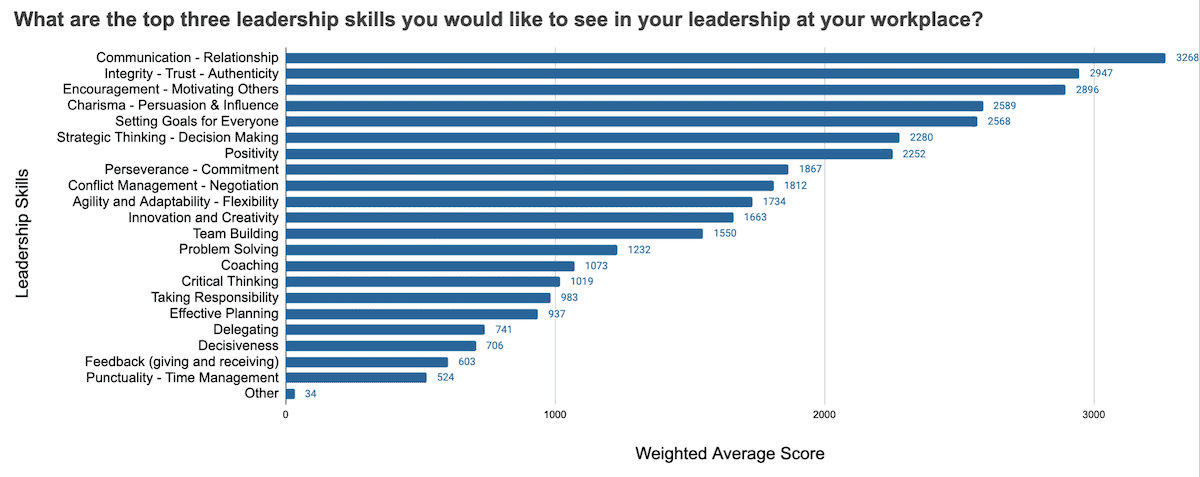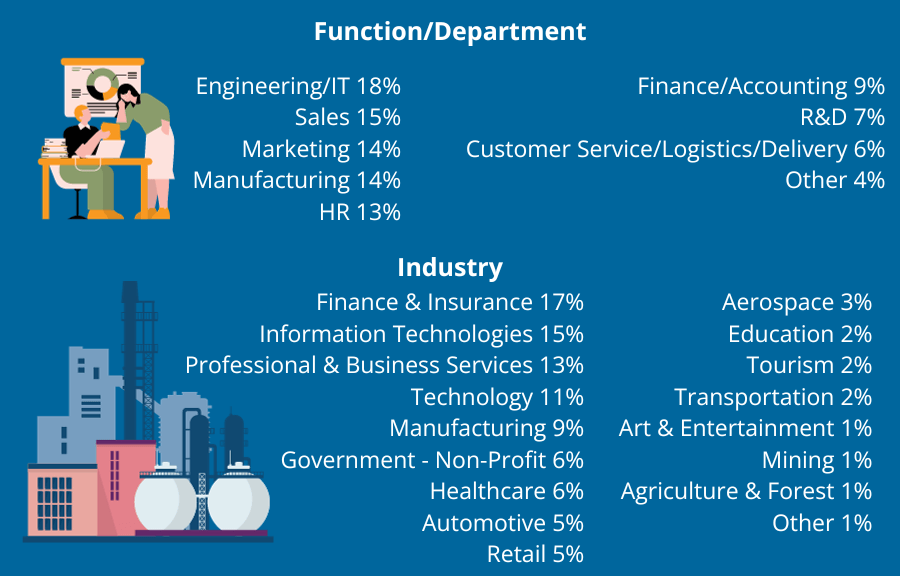21 Leadership Skills Professionals Expect to See in the Workplace
There are several leadership skills that must be present in leaders. You should have seen the “top leadership skills” types of posts before. This article differs from them. We’ve surveyed 6,992 professionals and asked them a single question: “What are the top three important leadership skills you would like to see in your leadership at your workplace?”. The results are inspiring.
In this article
📌 Hint: Do not skip this article, you will find FREE Leadership Training resources throughout the article.
Let’s go over the 21 effective leadership skills professionals expect to see at their workplaces.
💡 Transformational Leadership is the most demanded leadership style. Have you seen the 5 Steps to Transformational Leadership article?
Leadership Skills Survey
We’ve surveyed 6,992 professionals enrolled in professional business training programs at San Francisco Business School. You can see the demographics, titles, functions, industry details of the respondents, and methodology of the survey at the bottom of this article (*).
We’ve shown the 21 different types of leadership skills and asked respondents to pick the top three leadership skills they would like to see in their leadership or management at their workplace. Below are the results.

Watch 21 Leadership Skills Professionals Expect to See at the Workplace YouTube Video
If you like watching videos rather than reading, you can watch our Top 21 Leadership Skills YouTube video.
Top 21 Leadership Skills
We will go through each of these 21 leadership skills one by one.
Top Leadership Skills #1 – Communication – Relationship
Communication, relationship, and interpersonal skills are crucial for leaders. Based on research, executives and managers spend 90% of their time on communication. The survey results justify this as well.
Professionals seek for confident and easy communication with their leaders. They expect to see emotional intelligence and leaders who can see the issues from different perspectives. Have you seen leaders go to their room in the morning, go to meeting after meeting until the evening, and not set aside any time for their team? That’s an example of bad communication.
Leaders should wander around and be visible to the people in their team. So, people should feel comfortable when communicating with their leaders and the leaders should be easily accessible. That is why professionals pick communication as the top leadership skill.
Top Leadership Skills #2 – Integrity – Trust – Authenticity
Transformational leaders follow the rules, ethical standards, and moral principles. They are fair and at equal distance to all members of the group. Their actions are taken as a role model by others. Therefore, leaders must be trustworthy.
You should have seen examples where leaders or managers go along better, and have more personal relationships with some individuals compared to others. Humans are social, and this can be. However, your personal relationships must not affect your work and attitude toward the people in your team.
Enhance Your Leadership Skills – Executive Leadership Training Program
San Francisco Business School offers an online, self-paced comprehensive executive leadership training program. You can consider enrolling in this program to improve your leadership skills.
Top Leadership Skills #3 – Encouragement – Motivating Others
Leaders inspire people, motivate their team, and encourage them to produce the best results. Professionals seek encouragement as a leadership skill in their leadership team.
There are several ways to encourage people. The most common ways are setting clear goals, giving incentives, appreciation verbally, and celebrating success.
If you see any mistake or misbehavior of your team members, avoid talking about this in the group. Try to set up a one-on-one meeting. Refrain from phone or online meetings.
4- Charisma – Persuasion & Influence
Charisma is described as a personal quality of presence or charm that others find compelling. Charisma is one of the intangible but sensible traits of leaders. You cannot avoid charisma when defining leadership.
Scholars in sociology, political science, psychology, and management reserve the term for a type of leadership seen as extraordinary. In these fields, the term “charisma” is used to describe a particular type of leader who uses “values-based, symbolic, and emotion-laden leader signaling”.
Charismatic leaders combine charm, interpersonal connection, and persuasiveness to motivate others. Professionals seek charisma, persuasion, and influence leadership skills in their executives. These skills will help their business unit to overcome obstacles, communicate with other departments in the organization easily, and a better performance in the end.
Watch Laura’s 30 Seconds Experience – Executive Leadership Program
Hear from Our Alumni Laura Smith, Head of Design. Laura attended the Executive Leadership Program at SFBS.
5- Setting Goals for Everyone
Organizations have missions and visions. To reach those missions and visions, goals are set on an organizational level, and these goals are broken down to the department or business unit level. Then, goals are set on an individual level.
Professionals expect their leaders to set goals for everyone. This does not mean that everyone has similar goals. Depending on the experience, level, and skills of each individual, leaders must seek a fair goal distribution for everyone.
6- Strategic Thinking – Decision-Making
We are living in a fast-paced environment. This is similar to making business decisions as well. In some cases, leaders have to make a decision with limited data or under tough conditions.
Professionals expect their leaders to have strategic thinking and decision-making leadership skills. Strategic thinking refers to evaluating the several aspects of a move or decision. Strategic thinking is like playing chess, being able to see several steps ahead and decide based on the current situation.
Free Online Leadership Skills Training Program
One of the requirements to be a good leader is to improve yourself continuously. The best way to do this is, to enhance your competence through training. Take a step ahead and jumpstart your leadership competence. Enroll in our 1-hour Free Leadership Training program.
7- Positivity
Leaders should be realistic and positive. Sometimes, there is a misconception between positivity and seeing things through rose spectacles.
The dictionary meaning of positivity is the practice of being or tendency to be positive or optimistic in attitude. Leaders should be calm, positive, and optimistic. Otherwise, the negative energy can affect their team and it can hamper the business productivity in the organization.
8- Perseverance – Commitment
Perseverance and commitment is another important leadership skill. Once the goals are set, leaders should be perseverant throughout the journey to reach the goals.
It can be a long journey, and there can be disasters, roadblocks, impediments, and issues affecting the team to reach its goals. Professionals seek perseverance and commitment leadership skills in their management to go over the issues with patience.
9- Conflict Management – Negotiation
Conflicts are unavoidable wherever there is a human interaction. You should not be afraid of the conflicts. However, leaders must have conflict management and negotiation leadership skills.
There are five types of conflict management techniques:
- Avoiding: This is simply delaying to make a decision about the issue.
- Competing: Addressing the conflict directly and trying to solve the conflict as quickly as possible.
- Accommodating: This is resolving the issue by giving in to the opposing party.
- Compromising: This is referred to as “lose-lose” as well. Each side is pushed to make some sacrifices to reach a resolution.
- Collaborating: This method looks for “win-win” resolution. Parties look for a solution that will make everyone happy.
Leaders should use their leadership skills to overcome conflicts in the best way. Win-win may not be the ultimate outcome in some circumstances.
10- Agility and Adaptability – Flexibility
We are living in a fast-paced environment. Business conditions may change rapidly. So, leaders must be agile, and flexible and be able to adapt to changing conditions.
Professionals expect their leaders or managers to have agility, adaptability, and flexibility leadership skills. Agility refers to the ability to think and understand quickly. Adaptability refers to the quality of being able to adjust to new conditions and flexibility refers to adapting to changing circumstances and expectations of the workplace.
11- Innovation and Creativity
Innovation refers to finding new ways or ideas to overcome a situation. Typically, innovations are linked with new services or products. However, leaders are expected to be innovative when they hit a roadblock. Common ways or traditional techniques may not help the team to overcome the issue. Therefore, professionals expect their leaders to be innovative and creative.
12- Team Building
Team building is growing strong teams that have strong professional bonds and perform efficiently to provide better outputs. Tuckman identifies team building in five stages:
- Forming: The team is gathering at this stage. The team is structured, and no one knows each other enough.
- Storming: The team starts to perform and interpersonal conflicts start to arise.
- Norming: In this stage, team members are creating new ways of doing and being together. Team members start to trust each other.
- Performing: The most productive stage of the team. Everyone knows each other, and support is at the highest degree.
- Adjourning: The work is finished, and the team adjourns.
The critical moments in teams are when a new one joins the team, or if the whole team is formed recently. Leadership’s team-building skills will play a significant role in minimizing conflicts and reaching the maximum performance level.
13- Problem-Solving
In some cases, problem-solving is confused with conflict management. Typically, conflicts arise between people. However, problems can be related to anything including people.
For instance, if one of your team members is coming late every day, this is a problem. Similarly, if there has been a fire in your region and if your premises were damaged, this is also a problem.
Leaders must be calm and patient against problems. Problem-solving is an important leadership skill to overcome the issues.
14- Coaching
Coaching is a form of development in which an experienced person, called a coach, supports a learner or client in achieving a specific personal or professional goal by providing training and guidance. The learner is sometimes called a coachee. Occasionally, coaching may mean an informal relationship between two people, of whom one has more experience and expertise than the other and offers advice and guidance as the latter learns; but coaching differs from mentoring by focusing on specific tasks or objectives, as opposed to more general goals or overall development.
15- Critical Thinking
Critical thinking is the analysis of available facts, evidence, observations, and arguments in order to form a judgment by the application of rational, skeptical, and unbiased analyses and evaluations. In some cases, it might not be possible to avoid emotions when coming to a conclusion. However, leaders must refrain from emotional effects when they are making a decision. Therefore, critical thinking is one of the leadership skills.
16- Taking Responsibility
Leaders or managers are responsible for their teams. So, when there is a success, it accounts for the entire team. However, if there is a failure, people may start to look for a scapegoat. Leaders play a vital role here. They should prevent their team, and absorb the pressure coming from higher management. Leaders should take responsibility for their team.
17- Effective Planning
Businesses perform time-sensitive projects, tasks, or activities. In order to complete a project on time and on budget, effective planning skills are crucial. Therefore, professionals seek effective planning skills in their leaders.
18- Delegating
Professionals like delegating leaders. They want to be accountable for their activities. So, they want their leadership to set the goals and expectations, and give them the way to perform their activities. However, some leaders or managers are not confident after assigning tasks to their team.
Micromanagement is a pattern of manager behavior marked by excessive supervision and control of employees’ work and processes, as well as a limited delegation of tasks or decisions to staff. Typically, micromanagement is a flaw of new leaders or managers and professionals hate it.
19- Decisiveness
20- Feedback (giving and receiving)
In many cases, leaders or managers come together with their team members annually or every six months to make a performance review. This is a very long period. Leaders should be visible and approachable. The feedback mechanism should be two-way. Leaders should give feedback to the team members, well, this is normal. However, leaders should be mature enough to receive any type of feedback from team members as well.
Actually, feedback is one of the best ways to see how others see you. Therefore, make sure you establish a productive feedback mechanism in your organization.
21- Punctuality – Time Management
Typically, leaders and managers are very busy. Their calendar may shift during the day. However, they must find a way to plan important meetings on time. Even if they need to reschedule, they should be informed in advance instead of a no-show. So, professionals expect their management to have punctuality and time management leadership skills.
22- Other Leadership Skills
There are many other leadership skills you can name. However, we’ve listed the top 21 leadership skills and asked them to vote for our audience. A minority, 0.51%, of the respondents chose that there are other leadership skills than we listed above.
How to Develop Leadership Skills – 5 Common Ways
We’ve listed the top 21 leadership skills, but how can you develop your leadership skills? There are five common ways in which leaders develop and enhance their leadership skills.
1- Leadership Skills Courses/Programs
There are leadership programs or courses that you can attend and enhance your leadership skills. While courses focus on particular leadership skills, programs aim to develop your overall leadership presence and skills. For instance, San Francisco Business School offers an Executive Leadership Program.
Executive Leadership Training Program Covers:
- Generic & Adaptive Leadership – Change is inevitable and leaders must be prepared for the changing dynamics of the business environment. Learn how to adapt your leadership in changing circumstances.
- Grasping Power – Only powerful leaders sustain in a brutal business environment. You’ll learn how to grasp power.
- Servant Leadership – Leaders must be adaptive, servant, and transformational in today’s business world. Walk the path to be a servant leader that empowers people and organizations.
- Emotional Intelligence – Emotional effects are unavoidable wherever there is a human factor. Develop your competence to be an agile, optimistic, and humble leader. Learn how to show people why they matter.
- Tomorrow’s Leaders – You cannot lead the millennials the same way as you do for boomers. Increase your awareness for future leadership and transformational leadership.
- Leadership in Hard Times – While being an optimist leader, you have to be ready for the unanticipated cases. Improve your contingency planning skills, dealing with conflict of interest, and how to overcome a crisis.
You can check further on the program page.
2- Coaching
We’ve explained the coaching above. In coaching, the coach guides the coachee through real-life scenarios. In some cases, the coach can help the trainee with the real cases the trainee faces at work. There are several coaching programs available on the web. However, make sure to choose the right coach for you. It is important to choose a coach from a similar or even the same industry, who has gone through your career path before and who can guide you transparently.
3- Practicing
As in any profession, the best method to sharpen your leadership skills is practicing. Whenever you see a chance to practice your skills, do not hesitate. For instance, if you see a conflict between your colleagues, you can seek a resolution. Or, help a team member to make a decision.
4- Reading
You can consider reading leadership books, articles, or business blogs. There are phenomenal leadership books. You can make a reading list, and read those books to sharpen your leadership skills. You might be interested in our John C. Maxwell – Top 5 Leadership Books article.
5- Events
There are conferences, seminars, and webinars about leadership. You can follow these activities and attend them if they fit your schedule.
Note that, there are other ways to develop leadership skills such as volunteering, giving back, or on-the-job training. We’ve listed the most popular 5 ways to improve leadership skills.
Watch 5 Ways to Develop Leadership Skills YouTube Video
Summary – Effective Leadership Skills
Leadership requires several skills. Luckily, these can be earned later through education, programs, coaching, books, etc. There are 21 effective leadership skills that professionals seek to see in their management at the workplace. We’ve listed these skills in this article.
Professionals improve their leadership skills by attending courses or programs, coaching, practicing, reading, or events. There are other ways to improve leadership skills as well.
(*) Leadership Skills Survey Demographics & Methodology
You can see the demographics, titles, functions, industry details of the respondents, and methodology of the survey below.

The majority of the respondents are from the US. Approximately half of the respondents are performing functional roles such as engineer, analyst, specialist, etc. and the other half are managerial or leadership roles.

Respondents of the survey reflect the GDP distribution by industry in the US. Also, there are respondents coming from different functions or departments in an organization.
We’ve shown the 21 different types of leadership skills and asked respondents to pick the top three leadership skills they would like to see in their leadership at their workplace. When we are calculating the results, we have given different weights to the 1st, 2nd, and 3rd skills.
- 1st skill’s weight is 55%
- 2nd skill’s weight is 30%
- 3rd skill’s weight is 15%
The following table shows the number of respondents who picked each skill in their 1st, 2nd, and 3rd top leadership skills.
| What is the top three important leadership skill you would like to see in your leadership at your workplace? | 1st Skill (55% Weight) | 2nd Skill (30% Weight) | 3rd Skill (15% Weight) | Weighted Average Score |
| Communication – Relationship | 3846 | 2428 | 2826 | 3268 |
| Integrity – Trust – Authenticity | 2986 | 3158 | 2382 | 2947 |
| Encouragement – Motivating Others | 3164 | 2658 | 2388 | 2896 |
| Charisma – Persuasion & Influence | 2628 | 2396 | 2830 | 2589 |
| Setting Goals for Everyone | 2516 | 2964 | 1966 | 2568 |
| Strategic Thinking – Decision Making | 2414 | 2188 | 1972 | 2280 |
| Positivity | 2374 | 2170 | 1970 | 2252 |
| Perseverance – Commitment | 1856 | 2036 | 1572 | 1867 |
| Conflict Management – Negotiation | 1934 | 1796 | 1396 | 1812 |
| Agility and Adaptability – Flexibility | 1808 | 1748 | 1432 | 1734 |
| Innovation and Creativity | 1624 | 1810 | 1512 | 1663 |
| Team Building | 1572 | 1374 | 1824 | 1550 |
| Problem-Solving | 1386 | 1164 | 804 | 1232 |
| Coaching | 1196 | 974 | 818 | 1073 |
| Critical Thinking | 1138 | 912 | 796 | 1019 |
| Taking Responsibility | 918 | 902 | 1386 | 983 |
| Effective Planning | 806 | 1002 | 1286 | 937 |
| Delegating | 876 | 708 | 312 | 741 |
| Decisiveness | 796 | 490 | 810 | 706 |
| Feedback (giving and receiving) | 658 | 570 | 468 | 603 |
| Punctuality – Time Management | 614 | 508 | 224 | 524 |
| Other | 36 | 14 | 66 | 34 |
The weighted average is calculated as follows:
Weighted Average Score = (Number of Respondents Picked the Skill in 1st Place) * 0.55 + (Number of Respondents Picked the Skill in 2nd Place) * 0.30 + (Number of Respondents Picked the Skill in 3rd Place) * 0.15

